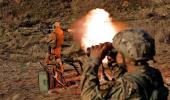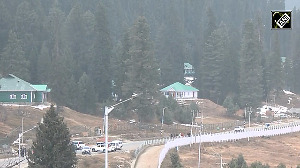Tensions between the United States and Russia have reached new heights amid the ongoing Ukraine conflict, with a series of developments marking a dangerous escalation.

The US Embassy in Kyiv announced its temporary closure on Wednesday following warnings of potential significant Russian airstrikes on the Ukrainian capital.
This comes after Ukrainian forces, for the first time, used US-supplied ATACMS long-range missiles to strike targets deep inside Russian territory, including Bryansk and Belgorod regions.
These attacks, made possible by a recent policy shift from US President Joe Biden, have drawn sharp condemnation from Moscow. Russian Foreign Minister Sergey Lavrov warned of a 'new phase' of Western involvement in the war, citing the use of US-made weapons in strikes on Russian soil.
In response to these developments, Russian President Vladimir Putin signed a decree updating Russia's nuclear doctrine.
The revised policy permits nuclear retaliation for conventional attacks supported by a nuclear power -- a scenario that could now encompass Ukrainian strikes backed by the US.
The Kremlin described the move as a necessary deterrent amid what it views as escalating Western aggression.
Meanwhile, reports have surfaced of North Korean troops assisting Russian forces on the battlefield, alongside the provision of artillery systems to bolster Moscow’s war effort. US officials believe these developments influenced Biden’s decision to allow Ukraine to conduct deeper strikes.
Adding to the unease, Kremlin spokesperson Dmitry Peskov revealed that the emergency hotline between the US and Russia, established during the Cuban Missile Crisis, is currently inactive.
Instead, communication between the two nations is limited to a protected presidential channel, raising concerns about the potential for miscommunication during this period of heightened tension.
While the Kremlin warned of severe repercussions, Western and Ukrainian leaders dismissed the nuclear posture update as a bluff aimed at deterring further military aid to Kyiv.
Nonetheless, these developments underline the increasingly international dimensions of the 1,000-day war, which shows no signs of de-escalation.
-- with inputs from ANI










